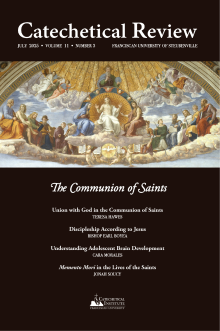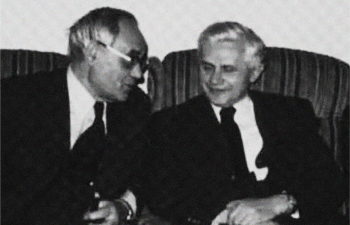 I have had the joy, honor, and privilege of working with adolescents for over 20 years, first as a Catholic high school teacher, and now as a licensed marriage and family therapist in the throes of raising my own tweens and teens. There are several key moments in my formation, work, and ministry that stick out in my mind.
I have had the joy, honor, and privilege of working with adolescents for over 20 years, first as a Catholic high school teacher, and now as a licensed marriage and family therapist in the throes of raising my own tweens and teens. There are several key moments in my formation, work, and ministry that stick out in my mind.
The first was a teaching demonstration I completed in my undergraduate studies. I was preparing to graduate without a clue of what my next step would be in my ministry and career, and as I stood before my peers and professor, I felt deep in my soul the Lord calling me to work with teenagers in the high school setting. A second moment occurred a few years later, during my time as a high school theology teacher. I had a student in one of my classes whom I tried to engage each day, only to have her ignore me or roll her eyes. One day, I walked into my classroom and found her crying beneath my desk. I listened to her cries and gave her tissues to wipe her tears as she opened up about the pain and suffering of her home life. As I sat, listened, and prayed, I heard the Lord call me to work with teenagers once again, but in a new way: as a therapist. Since then, there have been countless hours through the years of sitting with teens, listening as they share their pain and struggles and doing my best to bring light into their darkness and truth into their hearts. I am grateful for the call I have received, and I recognize the challenge that it has been.
I often feel that adolescents are unfairly criticized and misunderstood. They are described as emotional, irrational, uncontrollable, and, at times, an overall nuisance. Yes, adolescents can have big emotions. Yes, they experience uncertainty and upheaval in their lives—even several times in a given day. Yes, they want to go against the grain regularly and question everything and everyone. I believe, however, that the changes adolescents experience in this time of life, specifically in their brain development, are some of their strengths and superpowers rather than their downfall. When youth ministers have a deeper understanding of these changes, along with the obstacles and opportunities they pose, we are empowered to meet, serve, and accompany them better.
The rest of this online article is available for current Guild members.
[1] Daniel J. Siegel, Brainstorm: The Power and Purpose of the Teenage Brain (Penguin, 2015), 39.
[2] Siegel, Brainstorm, 79.
[3] Siegel, Brainstorm, 11.
[4] Siegel, Brainstorm, 11.
[5] Siegel, Brainstorm, 2.
Art Credit: Pier Giorgio Frassati, Wikimedia Commons.
This article originally appeared on pages 39 - 45 of the print edition.
This article is from The Catechetical Review (Online Edition ISSN 2379-6324) and may be copied for catechetical purposes only. It may not be reprinted in another published work without the permission of The Catechetical Review by contacting [email protected]


















